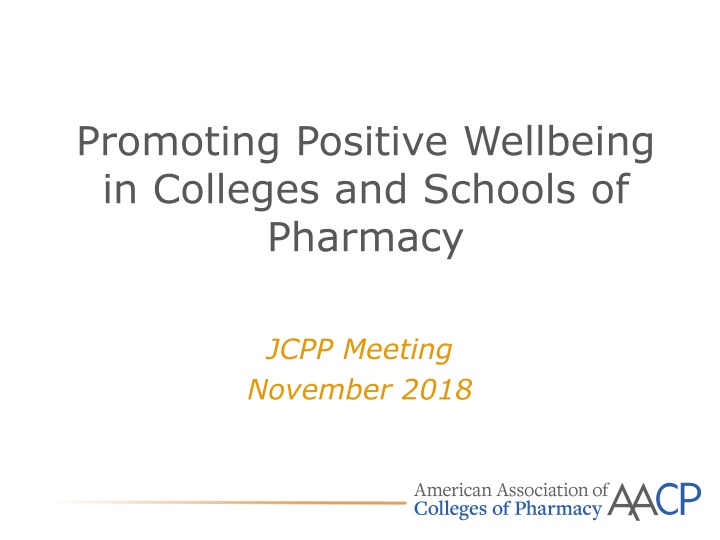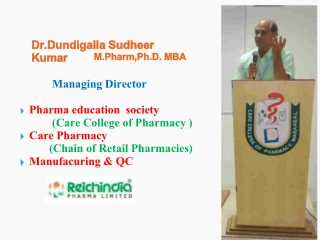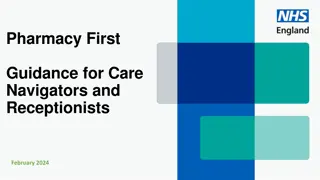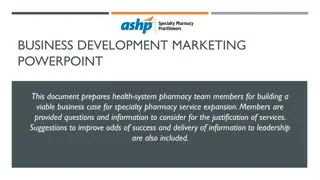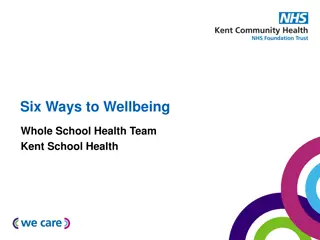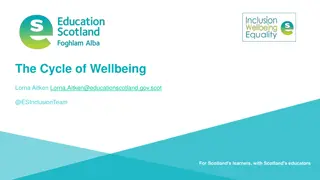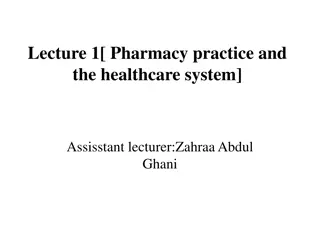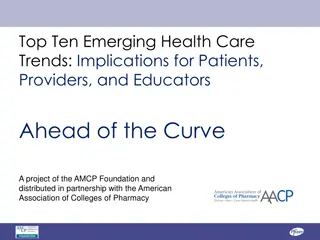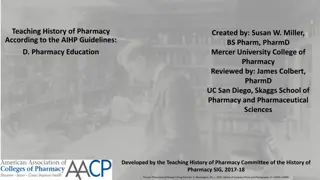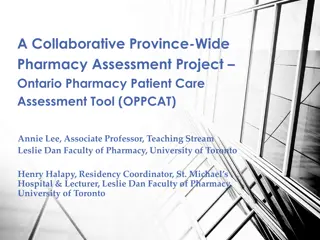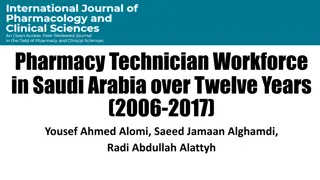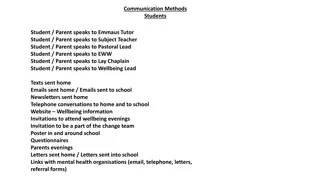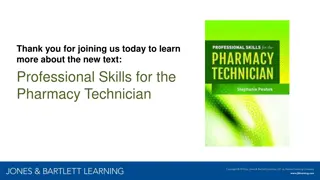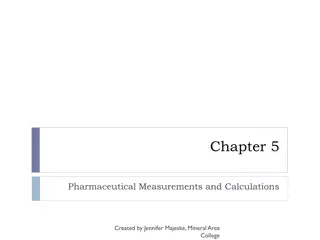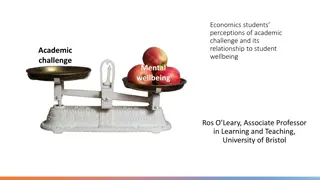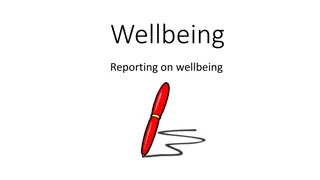Promoting Positive Wellbeing in Academic Pharmacy Settings
Addressing the state of wellbeing in colleges and schools of pharmacy, this content explores the impact of negative wellbeing factors, student pressures, the role of grit in pharmacy education, and the challenges faced by student pharmacists. It also delves into topics such as burnout, emotional exhaustion, and impostor syndrome among pharmacy students. Additionally, the rising stress levels among pharmacy faculty are examined. The content provides insights and resources to promote positive mental health practices in academic pharmacy environments.
Download Presentation

Please find below an Image/Link to download the presentation.
The content on the website is provided AS IS for your information and personal use only. It may not be sold, licensed, or shared on other websites without obtaining consent from the author.If you encounter any issues during the download, it is possible that the publisher has removed the file from their server.
You are allowed to download the files provided on this website for personal or commercial use, subject to the condition that they are used lawfully. All files are the property of their respective owners.
The content on the website is provided AS IS for your information and personal use only. It may not be sold, licensed, or shared on other websites without obtaining consent from the author.
E N D
Presentation Transcript
Promoting Positive Wellbeing in Colleges and Schools of Pharmacy JCPP Meeting November 2018
Overview State of Wellbeing in Academic Pharmacy Impact of Negative Wellbeing AACP Wellbeing Initiatives to Date
Students Under Pressure Rigorous academic demands Family and personal pressures Financial burdens Poor time management skills Social media https://www.ajpe.org/doi/full/10.5688/ajpe6862
Role of Grit in Pharmacy Education Disagreement on the role of grit in pharmacy education Grit scores higher for URM student pharmacists & lower for first-generation Disagreement on whether authentic grit can be taught in the classroom https://www.ajpe.org/doi/pdf/10.5688/ajpe6947 https://www.ajpe.org/doi/pdf/10.5688/ajpe816105 https://cptlpulses.com/2017/09/19/3gritquestions/
Student Pharmacists Under Pressure Perfectionism Higher rates in student pharmacists Imposter Syndrome Higher rates of depression and anxiety Correlated with burnout and women Low Mental Health Quality of Life Lower MHQL for P3 students vs US average Correlated with increased stress Marshall LL, Allison A, Nykamp D, Lanke S. Perceived stress and quality of life among doctor of pharmacy students. AJPE. 2008 Sep;72(6):137. Villwock JA, Sobin LB, Koester LA, Harris TM. Impostor syndrome and burnout among American medical students: a pilot study. Int J Med Educ. 2016;7:364-369. Henning K, Ey S, Shaw D. Perfectionism, the impostor phenomenon and psychological adjustment in medical, dental, nursing and pharmacy students. Med Educ.1998;32(5):456-464
The Road to Burnout http://ijobs.rutgers.edu/wordpress/2015/10/27/stress-and-burnout-in-graduate-school-recognizing-preventing-and-recovering/#sthash.CnDpmcg9.dpbs
Emotional Exhaustion Depersonalization Low Personal Achievement Burnout https://www.ajpe.org/doi/full/10.5688/ajpe81475Being
Pharmacy Faculty Stress on the Rise Pharmacy practice faculty suffer from burnout at higher rates than in past years and current medical school faculty Pharmacy faculty with higher emotional exhaustion: Women Assistant professors Those with young children Those who work high #of hours per week Those without a mentor https://www.ajpe.org/doi/full/10.5688/ajpe81475
Potential Impact of Faculty Burnout Decreased empathy and interest Disregard for student welfare Lack of desire to engage with students Lack of motivation to participate in required and non-required activities Decline in the quality of teaching https://www.chronicle.com/article/4-Ideas-for-Avoiding-Faculty/243010
Impact of Faculty Burnout on Schools Faculty turnover Low morale Poor teaching/job performance Low organizational commitment Absenteeism Halbesleben JR, Rathert C. Health Care Management Review 33 (1): 29 39. 2008; Williams ES, et al. Advances in Health Care Management 8: 3 20. 2009.
Impact of Stress on Individuals Depression Substance abuse Suicide ideation Anxiety Tijdink JK et al. BMC Medical Education 2014;14:183; Shanafelt TD et al. Ann Surg 2009;250:463; Kabat HP et al. report of the Council of Faculties Academic Affairs Faculty Development Committee Am J Pharm Educ 1989;53:423-429; Shanafelt T et al. Onocology 2005;68:23;Maslach C. Burned out. Hum Behavior 1976;5:16-22.
Impact on Patients Suboptimal care Reduced patient care Medical errors Lower patient satisfaction https://psnet.ahrq.gov/perspectives/perspective/190/burnout-among-health-professionals-and-its-effect-on-patient-safety Https://www.pharmacytimes.com/contributor/alex-barker-pharmd/2018/01/the-science-behind-pharmacist-burnout-is-scary-heres-what-to-do-about-it
AACP Wellbeing Initiatives to Date
Student Affairs Standing Committees Factors contributing to declining student resilience. Strategies to promote positive wellbeing on campus Strategies for working with students experiencing negative wellbeing Initiatives to enhance student wellbeing
AACP Policy Statements AACP encourages schools and colleges of pharmacy to proactively promote overall wellness and stress management techniques to students, faculty, and staff. Source: Student Affairs Committee, 2017 AACP believes that all administrators, faculty, staff, preceptors, student pharmacists and alumni should contribute to a culture of wellness and resilience in pharmacy education. Source: Student Affairs Committee, 2018
Academic Leadership Fellows Program Achieving a healthy balance between the commitments of work and home life. https://www.aacp.org/resource/alfp-prospectus
AACP Institutes: Fall 2018 & Spring 2019 Strategies to Promote a Culture of Well-being among Students and Faculty Defining Well-being, Grit and Resilience Promoting Well-being and Preventing Burnout in Faculty Crisis and Campus Threat Assessment Teams Mind-Body Medicine Program Developing Real Life Solutions for Modern Day Student Stressors Designing a Well-being Program for Students
Institute Lessons: Program Review Train faculty/staff to identify stress points Identify intellectual challenges, changes Acknowledge student stressors Examine grading systems Adjust, synchronize curriculum Align exams
Institute Lessons: Support Services Examine clerkship structure and support Prepare students for difficult situations Offer mental health services Promote mindfulness, stress reduction Offer financial advising and support Develop offices of student wellbeing
Institute Lessons: Assessment Recognition of students in distress Assessment of students at risk for self- harm and suicide Proper support and referral process Grief support when tragedy strikes Supportive faculty advising and mentoring
Wellness Webinar Series Resilience: An Essential Component of Today s Pharmacist Addressing our Students Mental Health & Emotional Needs Mental Health Crisis: What Do I Do Now? Faculty Well-being: Stay Grounded in the Busyness of Life
Selected AJPE Articles on Wellness Assessment of Burnout and Associated Risk Factors Among Pharmacy Practice Faculty in the United States Heart of Pharmacy: A Course Exploring the Psychosocial Issues of Patient Care It is Time to Confront Student Mental Health Issues Associated with Smartphones and Social Media Quantitative and Qualitative Factors Associated with Social Isolation among Students from Graduate and Professional Health Science Programs Review of Grit and Resilience Literature within Health Professions Education The roles of empathy, attachment style, and burnout in pharmacy students academic satisfaction Transition and Student well-being - Why We Need to Start the Conversation
NAM Partner Organization Action Collaborative on Clinician Well-Being and Resilience AACP is deeply committed to collaborating with other health profession organizations and stakeholders to promote positive well-being and resilience among health care providers, educators, and students. AACP recognizes that stress and anxiety can have devastating consequences on mental health, student learning, patient care, and the community at large. https://www.aacp.org/article/commitment-clinician-well-being-and-resilience
Graduating Student Survey Proposed questions to assess student perceptions about wellbeing at the end of the Pharm.D. degree program
Discussion Libby J. Ross, MA Senior Director, Student Affairs American Association of Colleges of Pharmacy 703.479.3809 Lross@aacp.org www.aacp.org www.pharmacyforme.org
